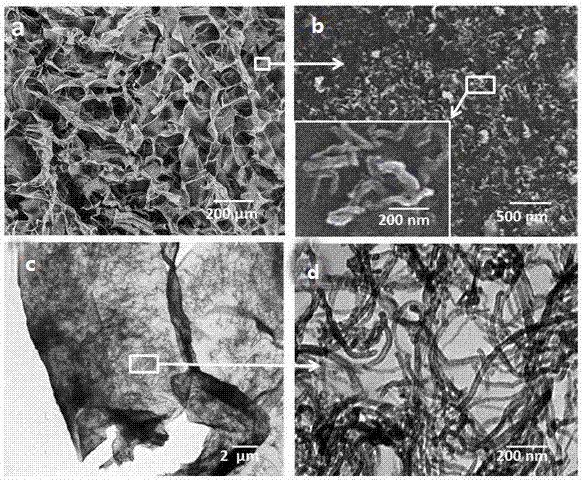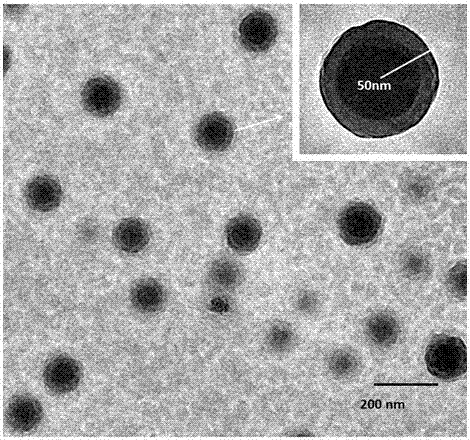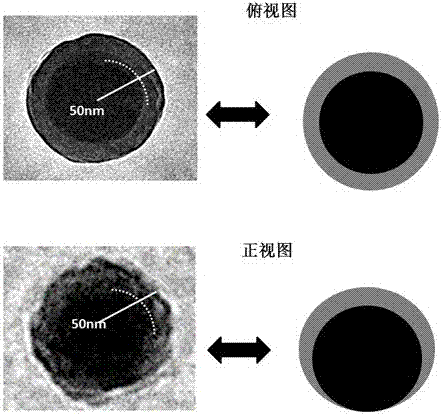a cu 2 o@cuo semi-core-shell nanocomposite material and preparation method thereof
A technology of nanocomposite material and core-shell structure, applied in the field of composite material and its preparation, can solve the problems of complex process, high cost, unfavorable electron transport, etc., and achieve the effect of low preparation cost, mild reaction conditions and simple process
- Summary
- Abstract
- Description
- Claims
- Application Information
AI Technical Summary
Problems solved by technology
Method used
Image
Examples
Embodiment 1
[0032] 0.1 g of CNTs was ultrasonically dispersed in 100 mL of deionized water to prepare a CNTs dispersion. 1 g chitosan (CS) was dissolved in 100 mL 1% acetic acid aqueous solution to prepare 1 wt.% CS solution. 8 mL of CNTs dispersion and 2 mL of CS solution were ultrasonically mixed for 5 min. Add 0.2 mL of 1% glutaraldehyde aqueous solution and stir for 15 min. The mixture was poured into a template and freeze-dried for 24 h. Washing with water and ethanol several times and drying in vacuo yielded purified carbon sponges. The obtained carbon sponge structure is shown in Fig. from SEM figure 1 In a, it can be seen that the porous sponge structure based on CS is conducive to the adsorption of metal ions. figure 1 b is the rough structure of the CS surface after magnification, and the inset shows the CNTs protruding from the CS surface, which are used for electrical conduction in sensing. TEM figure 1 c, 1d also show CNTs embedded in CS.
[0033] Take 0.015 g carb...
Embodiment 2
[0036] 0.1 g of CNTs was ultrasonically dispersed in 100 mL of deionized water to prepare a CNTs dispersion. 1 wt.% CS solution was prepared by dissolving 1 g chitosan (CS) in 100 mL 1% acetic acid aqueous solution. 10 mL of CNTs dispersion and 2 mL of CS solution were ultrasonically mixed for 5 min. Add 0.2 mL of 1% glutaraldehyde aqueous solution and stir for 15 min. The mixture was poured into a template and freeze-dried for 24 h. Washing with water and ethanol several times and drying in vacuo yielded purified carbon sponges. Experiments have shown that changing the ratio of reactants within a certain range will not affect the material synthesis.
[0037] Take 0.015 g carbon sponge into 8 mL 0.1 M CuSO 4 The solution was adsorbed for 24 h, the remaining solution was removed, and 5 mL of 0.5 M NaBH was added dropwise on the surface 4 After reacting for 2 h, the remaining solution was removed and oxidized in air for 5 h, washed with ethanol and dried in an oven at 60 °C...
Embodiment 3
[0039] 0.1 g of CNTs was ultrasonically dispersed in 100 mL of deionized water to prepare a CNTs dispersion. 1 wt.% CS solution was prepared by dissolving 1 g chitosan (CS) in 100 mL 1% acetic acid aqueous solution. 8 mL of CNTs dispersion and 2 mL of CS solution were ultrasonically mixed for 5 min. Add 0.2 mL of 1% glutaraldehyde aqueous solution and stir for 15 min. The mixture was poured into a template and freeze-dried for 24 h. Washing with water and ethanol several times and drying in vacuo yielded purified carbon sponges.
[0040] Take 0.015 g carbon sponge into 8 mL 0.1 M CuSO 4 The solution was adsorbed for 24 h, the remaining solution was removed, and 5 mL of 0.4 M NaBH was added dropwise on the surface 4 After reacting for 2 h, the remaining solution was removed and oxidized in air for 2 h, washed with ethanol and dried in an oven at 60 °C. Obtain uniformly dispersed Cu 2 O@CuO half-core-shell nanoparticles. Experiments have shown that changing the concentrat...
PUM
| Property | Measurement | Unit |
|---|---|---|
| radius | aaaaa | aaaaa |
| radius | aaaaa | aaaaa |
Abstract
Description
Claims
Application Information
 Login to View More
Login to View More - R&D
- Intellectual Property
- Life Sciences
- Materials
- Tech Scout
- Unparalleled Data Quality
- Higher Quality Content
- 60% Fewer Hallucinations
Browse by: Latest US Patents, China's latest patents, Technical Efficacy Thesaurus, Application Domain, Technology Topic, Popular Technical Reports.
© 2025 PatSnap. All rights reserved.Legal|Privacy policy|Modern Slavery Act Transparency Statement|Sitemap|About US| Contact US: help@patsnap.com



